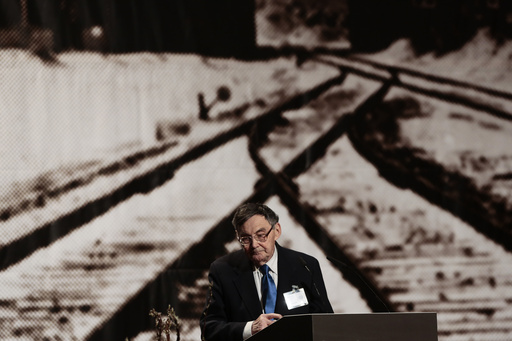
WARSAW, Poland — Marian Turski, a notable Holocaust survivor who went on to become a prominent journalist and historian in postwar Poland, passed away on Tuesday at the age of 98.
The POLIN Museum of the History of Polish Jews announced his death, highlighting Turski’s remarkable moral and intellectual character, emphasizing his dedication to advocating for minorities and the disenfranchised.
Zygmunt St?pi?ski, the museum’s director, praised Turski as an international authority, a proponent of Polish-Jewish relations, and an essential contributor to the museum’s establishment.
Having survived the Lodz ghetto, Turski endured two harrowing death marches and was imprisoned in the notorious Nazi concentration camps of Buchenwald and Auschwitz-Birkenau, which were situated in German-occupied Poland.
Tragically, he lost 39 members of his family during the Holocaust. Unlike many Jewish survivors who left Poland after the war, Turski decided to stay and was firmly on the left politically throughout his life, becoming a member of the communist party.
In 1956, while studying in the United States, he participated in the civil rights march from Selma to Montgomery alongside Martin Luther King Jr.
As one of the remaining Holocaust survivors, Turski spoke at events commemorating the 80th anniversary of the liberation of Auschwitz-Birkenau last month.
His poignant message served as a stark reminder of the perils of indifference, which gained him significant international recognition and elevated his moral standing among followers.
He expressed that the Holocaust was not a sudden occurrence but resulted from a gradual acceptance of discrimination that led to the horrors of ghettos and extermination camps.
Turski urged an audience of world leaders to remain vigilant against discrimination, historical distortion, and violations of social contracts.
His statements were often viewed as a critique of Poland’s right-wing government, prompting mixed reactions. Some people criticized him for addressing political issues during the Auschwitz anniversary, while others questioned his moral authority, citing his past communist affiliations.
Citing fellow survivor Roman Kent, Turski asserted that a crucial lesson was encapsulated in what he termed the Eleventh Commandment: “Thou shalt not be indifferent.”
He cautioned that indifference could pave the way for future atrocities, warning, “Before you know it, another Auschwitz will come out of the blue for you or your descendants.”
Michael Schudrich, Poland’s chief rabbi, expressed deep admiration for Turski, considering him a teacher and moral guide.
“Marian was our moral voice and mentor, steeped in Jewish wisdom, guiding us through today’s challenges,” Schudrich stated.
Polish Prime Minister Donald Tusk remarked that Turski’s words had become a guiding principle for times of difficulty, referring to it as “The 11th Commandment for these difficult times.”
President Andrzej Duda also paid homage to Turski, emphasizing his consistent emphasis on the importance of sensitivity to evil.
Born on June 26, 1926, as Mosze Turbowicz, Turski spent his formative years in Lodz, where he studied at a Hebrew language school.
In 1944, he faced the devastation of having his parents and brother deported to Auschwitz, with Turski arriving shortly after in one of the final transports.
His father and brother were victims of the gas chambers, while his mother was sent to the Bergen Belsen labor camp.
Turski himself was forced to work on road construction in Auschwitz-Birkenau before enduring two subsequent death marches, ultimately being liberated from Terezin, where he was on the brink of death from exhaustion and illness.
Upon his return to Poland in September 1945, Turski committed himself to the communist cause, rejecting an opportunity to emigrate to the West and instead aspiring to help build a socialist Poland.
When advised by a communist official to adopt a less Jewish-sounding name, he complied, as recorded in a biography released by the POLIN Museum.
In his final address at last month’s Auschwitz anniversary, Turski reiterated the dangers of hatred and underscored the stark reality that the number of those who perished during the Holocaust far overshadowed the tiny group of remaining survivors.
“We have always been a tiny minority,” he reflected, “and now only a handful remain.”

